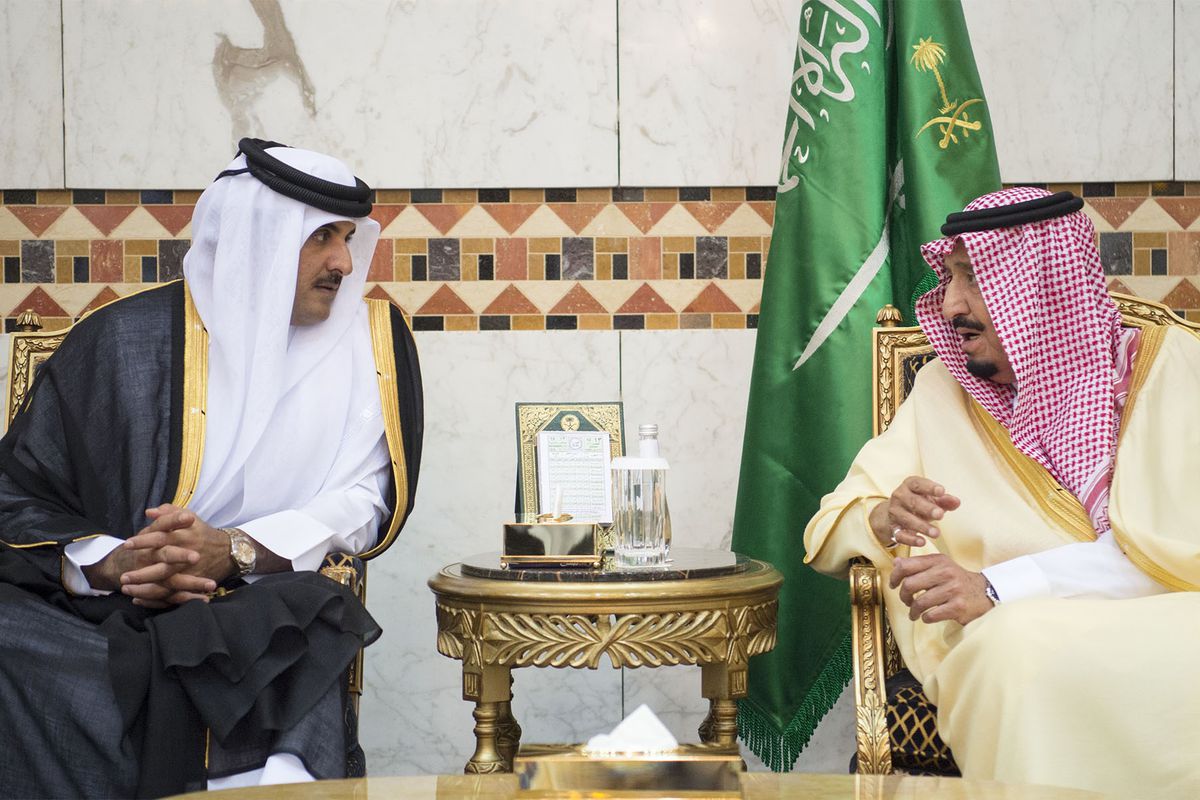Alwaght- Qatar’s foreign minister last month visited Saudi capital to discuss with regime’s authorities a end the diplomatic crisis between neighboring Persian Gulf Arab states, verifying the months-long speculations that Riyadh and Doha may soon repair their relations two years after Saudi Arabia and its Arab allies cut off their ties with Qatar accusing it of supporting terrorism, something the Qatari leaders strongly denied saying that the Saudis want to curtail their state’s sovereignty.
In an important development, the Qatari foreign ministry said that Saudi Arabian King Salman bin Abdulaziz invited Qatar’s Emir Sheikh Tamim bin Hamad Al Thani to a (Persian) Gulf Cooperation Council’s meeting set for Tuesday, declining to the make clear what was the emir’s response to the invitation.
Saudi Arabia, Egypt, the UAE, and Bahrain severed ties with Qatar in June 2017 shortly after they accused it of supporting terrorism. They set 13 conditions for the small Arab emirate— including shutting down its highly influential Aljazeera news network, end friendly ties with Iran, and close a Turkish-operated military base on its soil— to follow if it wanted them to mend ties and lift an all-out ban from the air, sea, and ground.
The invitation to the Qatari leader during the time of crisis is not happening for the first time. In June, King Salman invited Al Thani to a Mecca meeting but the latter declined to attend and instead sent his foreign minister, signaling that the ground is yet to be prepared for a diplomatic normalization.
Now the question is that what happened since the last invitation that now the hopes for an end to the unprecedented diplomatic crisis inside the (P) GCC have grown.
Important reconciliation signs
Part of what makes this invitation distinct from previous ones is certainly the developments in the two sides’ ties rare since 2017. The first one is the announcement of readiness of the blockading sides to take part in the (P) GCC football cup hosted by Doha. The blockaders in 2017 boycott the tournament.
Yet another positive sign is announced by Kuwait whose officials said that there has been development in talks it mediated between Saudi Arabia and Qatar. Since the eruption of the crisis, the Kuwaiti emir tried to play between the two sides as a mediator. He chose to go the way behind the scenes and not to give the developments any media publicity as he found the media controversies a hurdle ahead of the process. But now Kuwait has set aside the conservatism and talks about an advancement in the negotiations.
Last month, the Kuwait Deputy Foreign Minister Khaled al-Jarallah said that the decision of the sanctioning states to take part in the Doha-hosted cup is a clear sign that advancement is made to settle the intra-Arab crisis. Kuwait canceled its hosting of the (P) GCC summit this week to allow Saudi Arabia to host it like last year. Having in mind that Riyadh spearheads the sanctioning bloc, this move by Kuwait is another effort to mend the Qatari-Saudi relationship and end the crisis.
There have been also news about the exchange of visits by the Saudi and Qatari officials. One important visit is reportedly made by Qatar’s FM and talking with Saudi Crown Prince Mohammed bin Salman, the de facto ruler of Saudi Arabia who personally pursues Qatar case.
What concessions can Qatar make?
The signs of an upcoming rapprochement raise a question: What does encourage the Saudis show flexibility to Doha? To put it differently, what concessions can Qatar make in exchange for normalization?
Wall Street Journal in its report of the secret visits of Qatari FM claimed that Al Thani showed interest to cut off relations with the Muslim Brotherhood, an Islamist movement spreading across the Arab world and challenging the Western-reliant monarchies, in return for normalized relations with Saudi Arabia. Riyadh in reaction said that it will entertain the proposal, the American paper added.
Although the Wall Street Journal’s report has not been confirmed yet and odds are it is not true because there is a strong alliance between Qatar and Turkey which are the two backers of the Muslim Brotherhood, this is enough to believe that Saudi Arabia has sustained a big defeat in its policy of coming tough on Qatar.
Since the beginning of the ban, Doha firmly rejected to bow to the Saudi conditions. So it hardly walks back from its stance after it successfully absorbed the pressures.
Additionally, the current regional conditions indicate that things are against what Saudi Arabia wishes. Bin Salman’s aggressive policies have failed to bring him any fruits in the face of the regional rivals. In fact, the Arab kingdom is emerging as a loser of the regional cases despite the huge spending. The enormous costs of these policies drew the condemnation of Prince Mohammed’s home and foreign supporters. The pressure now is making him review his positions in a face-saving move.
With the end of the crisis between the two countries, we should expect a new style of relations inside the (P) GCC. In the new order, Saudi Arabia will lose the role of a big brother.



























